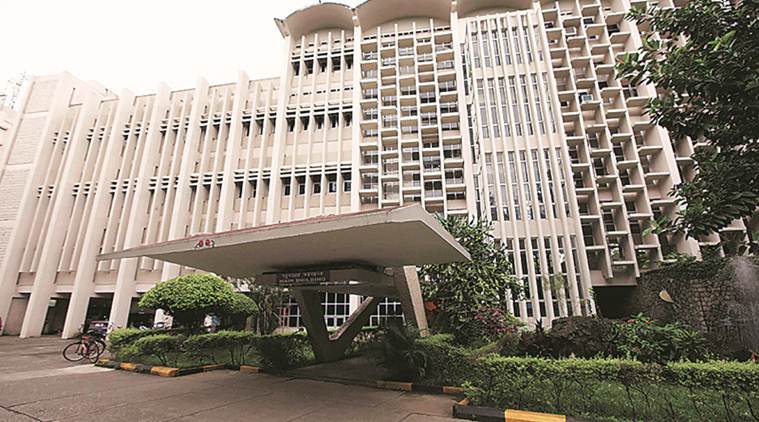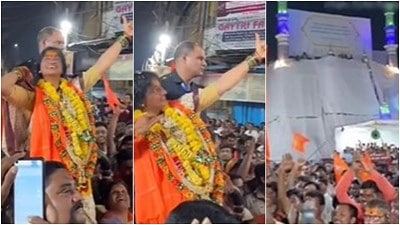- India
- International
Tracking Change: In Century Of Biology, IITs Make Space For Life Science
The curriculum tweak by the IITs, however, isn’t just limited to the introduction of basics of biology. IIT-Madras, which has a mandatory course since 2005, revamped it in 2015 to introduce electives, such as big data in biology, bio-energy.
 In IIT Bombay, biology is mandatory for first-year students. File
In IIT Bombay, biology is mandatory for first-year students. File
FROM MECHANICAL, civil and chemical engineering to cell structure, evolution, genetic code and disease control. In the “century of biology”, IITs across the country are adapting to a new reality.
With internal surveys showing that an estimated 20 per cent of start-ups that sprout in their ecosystem tilt towards healthcare and medicine, several IITs are tweaking their curriculum in the new hope that engineering can lead to breakthroughs in biology and medicine. Over the last decade, at least six IITs — Kanpur, Kharagpur, Delhi, Bombay, Madras and Guwahati — have introduced Biology or Life Science as a compulsory course for undergraduate students across engineering branches.
“We live in a world of convergence. The knowledge of biology for engineers and that of physics and mathematics for biologists are equally important. Without it we cannot create next generation technology,” IIT Kharagpur director Partha Chakrabarti told The Indian Express.
At IIT Kharagpur, a compulsory course, namely ‘Science of Living System’, was introduced as early as 2010. It is meant for students of all branches in their second year. From the next academic session, the institute will also start a do-it-yourself biology laboratory, in addition to the theory course. “There are many engineering problems where knowledge of biology is a definite asset. There’s always been some kind of synergy between the two. In civil engineering, the environmental processes to be followed are in the realm of biology. A mechanical engineer working on prosthetics needs an understanding of biology,” says Devang Khakar, director of IIT-Bombay.
In IIT-Bombay, a course in biology has been compulsory for first-year students since 2013. IIT-Kanpur and IIT-Delhi introduced it in 2011 and 2013, respectively. The shift also comes as a signal to school boards that have traditionally, after Class 10, designed curriculum that has made Math or Biology optional. For them, the IIT model is a nudge to start blurring the lines and make Life Science an integral subject for those picking the engineering stream.

At IIT-Bombay, out of the 37 companies being currently incubated by its Society for Innovation and Entrepreneurship, 14 are either dealing with medical technology or healthcare. One of them, CareMother, for instance, provides mobile technology for early detection of high risk pregnancies.
Shantanu Pathak, who is the co-founder of CareMother, pursued his B.Tech in electrical engineering from Mumbai University, which did not offer a compulsory component in biology. “I did not even have Biology as a subject in Class 12. So when I decided to start CareMother, I had to read up on the human anatomy, especially the female reproductive system to understand what high-risk pregnancies are and the clinical protocol for it. It’s only after that I was able to interact with the doctors to understand the problem and think of an innovative solution,” says Pathak.
”While I read up on human anatomy on my own, I think a foundational course would have been helpful during my B.Tech years. Without it, engineers working in healthcare and medicine would have to limit themselves to automation, design and sensor building,” he says. Emulating the IIT example, the model curriculum for engineering released this year by the All India Council for Technical Education (AICTE) advises institutes to teach basics of Biology to students in addition to Chemistry and Physics.
The curriculum tweak by the IITs, however, isn’t just limited to the introduction of basics of biology. IIT-Madras, which has a mandatory course since 2005, revamped it in 2015 to introduce electives, such as big data in biology, bio-energy, medical diagnostics and bio-process, in its paper called ‘Life Sciences’. “Earlier, this course only had a core module on topics such as the origin of life and evolution, cell structures and chromosomes. But now electives have also been introduced in the compulsory paper and student have to choose two out of five elective modules. The idea is to keep them clued in about the advances in the biology,” says D Karunagaran, head of the biotechnology department at IIT-Madras.
The course module of Life Sciences at IIT-Madras sums it up.
“The previous few centuries saw a better fundamental understanding of the physical and chemical world through advances in physics and chemistry. The better understanding and advances gave rise to technologies and products, such as computers, communication devices, aircraft, and others that revolutionized life. Since this is the century of biology, a similar phenomenon is expected which will lead to probably another revolution. Many engineers are expected to contribute to a biological aspect to fuel this revolution.”
Apr 18: Latest News
- 01
- 02
- 03
- 04
- 05







































